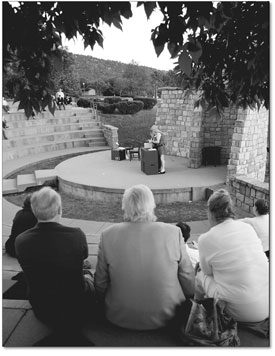|
| ||||
| An unquenchable fire
by Judith Reynolds Mary Wollstonecraft, the 18th-century Brit whom many refer to as the first feminist, had her enemies. Men in general, women in general, Edmund Burke in particular, and the press. In a new play by the American poet and playwright Grace Cavalieri, Wollstonecraft’s publisher reminds her that the press calls her “a hyena in petticoats.” Hence Cavalieri’s title for the play, an evocation of a brilliant woman who was full of contradictions. A reading of “Hyena in Petticoats” will be staged at 8 p.m. on Thurs., June 14, as the second offering in the Fort Lewis College summer series: Voices in American Drama. Lisa Kramer, a freelance theatre director, educator and writer, will direct. “‘Hyena’ is a very intelligent play,” Kramer said in an interview earlier this week. “The playwright really gets into Wollstonecraft’s mind. Wollstonecraft was a very strong woman, a mover and shaker, especially in education,” she said. “I like directing strong women characters; I think that’s why they offered this play to me.” Kramer moved to Durango in 2005 and has since directed several dramatic productions. Last summer she directed three plays for the Fort Lewis College summer play reading series. Earlier in the year she directed “Wiley and the Hairy Man” for Durango Lively Arts and “Parallel Lives” for the Durango Acting Studio. She has been a visiting professor at the college in drama and writing, and in the fall will conduct an Honors Forum on Theatre for Social Change. Of all the summer plays, “Hyena” is the most ambitious. It has a large cast, nine actors playing 13 parts, including historical figures as well as fictional characters. “The plot seems pretty linear at first,” Kramer said, “with some fudging of the history.” Wollstonecraft lived from 1858 to 1797. She grew up in a brutal household and found a way to teach herself to read and write then escape at age 18. She shared her knowledge with her sisters, founded a school for girls, and went on to greater things as a writer and champion of equality. Unfortunately she died following the birth of her second daughter, Mary Wollstonecraft Shelley, the author of “Frankenstein.” “In the play,” Kramer said, “the characters are largely based on real people, but the playwright also introduces fictional circus performers who serve as narrators – Punch and Judy.” Punch (Stephen Juhl) and Judy (Kelesey Deery) open the play with a brief prologue. Based on the famous puppet couple who battle out the war of the sexes, this Punch and Judy also echo their circus lineage, “Punchinello, circus clown and his partner,” Kramer said. The saucy duo will appear from opposite sides of the stage, perform tricks, address each other as characters, and most importantly, introduce Wollstonecraft’s story to the audience – in rhymed couplets. The action, once begun, may be linear, but this highly stylized introduction reminds us that Cavalieri has crafted a highly imaginative interpretation of Wollstonecraft’s life. The playwright also uses other techniques beyond conventional dialogue, one scene has voice over and another reading from letters. The time line is fairly long, from Wollstonecraft’s tee-nage years to her early death at age 38. “The play starts while she is still living in her father’s oppressive home,” Kramer said. Wollstonecraft’s sisters appear early and are important characters throughout the play. “Mary claims her right to have an education, and although she has taught herself how to read, a clergyman becomes a mentor and helps her leave the family. The focus throughout is on Wollstonecraft’s conflicts over education, equality and the rights of women.” Kramer said she hopes to be true to all the characters, especially the central role of a “brilliant, witty and very verbal woman.” But there is one challenge Kramer said she chose not to confront: British accents. “That’s one choice I decided not to make,” she said. “This is a staged reading with limited rehearsal time, so no one will attempt a British accent.” The language reflects a certain formality suitable to an 18th-century time frame, Kramer added. The use of stylized narrators and rapid sequencing of scenes seems modern. “The themes certainly resonate today,” Kramer said: gender equality and the right of women to determine their own lives. “I don’t want the play to be a history lesson, but I do encourage people in the audience to read the notes I’m writing for the program. It will be a summary to help understand the many connections. It will certainly mention Wollstonecraft’s famous 1792 treatise, ‘A Vindication of the Rights of Women.’ But this is still a drama, and people will ‘get it’ even if they don’t know much about the central character.” Like other readings in the series, “Hyena in Petticoats” will have minimal technical support – some music to set the piece in its time period, some costume pieces, and “a few props,” Kramer said. The fully staged version will last about two hours, and all the players will remain on stage throughout the performance. In case of rain, the play will move indoors to the Mainstage in the theater building across the green from the clock and amphitheatre. •
|



